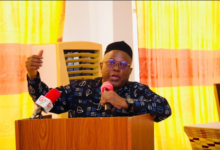
A child friendly gender-based Court has been inaugurated at Asante Akropong, in the Atwima Nwabiagya Municipality of the Ashanti Region.
The court, the sixth of its kind funded by the government of Denmark, is fitted with facilities and equipment that would make the interaction with judicial processes a little more bearable for children.
It would enable the children to testify from a different room via a two-way video system, keeping them a step removed from their alleged abusers.
Similarly, it has a playroom with toys and books that they could occupy themselves with while they wait.
The Direct Transcription System would also increase the efficiency of the entire process by making records of proceedings available on the same day.
Inaugurating the facility on the weekend, Justice Anin Yeboah, the Chief Justice, noted there were obvious reasons the Judicial Service had been so keen on making the court child-friendly, while also setting up specific courts to prosecute cases of gender-based violence.
He observed it was an unfortunate reality that gender-based violence and crimes against children were rampant in the society, “and still more unfortunate is that only a small percentage of these cases are brought to trial and successful prosecution.”
The Chief Justice mentioned that Ghana’s social structure and some unfortunate beliefs were among the reasons why such cases were not reported and often dealt with at home, ignoring the fact that “these are crimes that the State must address itself to, using its prosecutorial power.”
He said the Service would likely do better in prosecuting such crimes “if the physical and procedural aspects of our court system were more suited to prosecuting cases of such nature.”
The Chief Justice assured that the Judicial Service was fully aware of its responsibility to children, women and the vulnerable, and “we will continue to make every effort to ensure that the justice system protects and preserves their safety and security.”
“As a partner, UNICEF identifies fully with our vision in this aspect of justice administration and is demonstrating it in various practical ways. We are grateful to UNICEF and we hope that this partnership will continue to endure,” he emphasised.
Mr Tom Norring, Denmark Ambassador to Ghana, observed that during the lockdown as a result of the COVID-19 pandemic, assessment conducted by the UNICEF and partners on violence and abuse revealed that 32 per cent of adolescents and young people reported having observed increased abusive behavior with their families of which 32 per cent was emotional, 17 per cent physical and 10 per cent sexual.
To remedy the situation, he said the Danish government, through the embassy in Accra and UNICEF, launched a 5.6 million US Dollars to support Ghana’s COVID-19 response to reduce the spread and impact of the disease, provide water, sanitation and hygiene infrastructure to residents in low-income high density urban communities in Greater Accra and Greater Kumasi, as well as eliminating sexual and gender-based violence by establishing child friendly gender-based violence courts in six regions, and training of 700 staff of the judicial service, police, social welfare and Domestic Violence and Victims Support Unit among others.
Denmark, he said, had already done quite a lot to support Ghana’s effort to put an end to all gender-based violence through their various programmes, “including over 20 years of support to the judicial service.”
FROM KINGSLEY E.HOPE, AKROPONG







